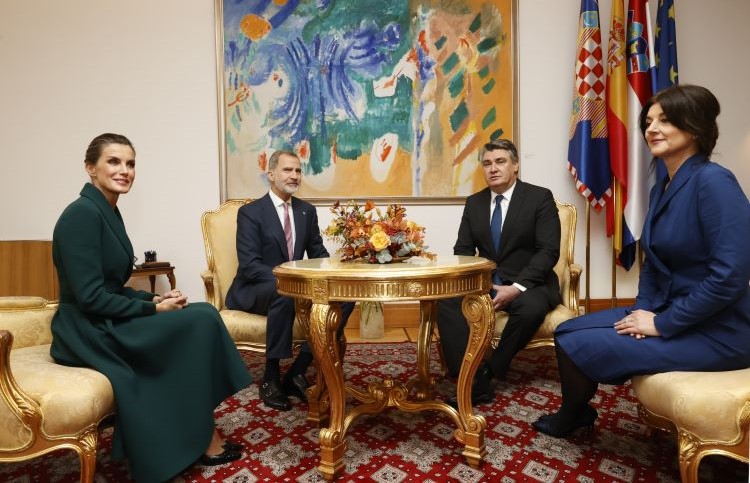The Diplomat
King Philip VI said yesterday, during his official visit to Zagreb, that relations between Croatia and Spain “have been growing closer in recent times” thanks to the “common membership” of NATO, the Council of Europe and the EU and the “common Mediterranean link” between the two countries.
Philip VI and Letizia have been making since yesterday the first official visit of a King and Queen of Spain to Croatia since the country’s independence in 1991, coinciding with the celebration of the 30th anniversary of bilateral diplomatic relations, which took place on March 9. The King and Queen are accompanied by the Minister of Science and Innovation, Diana Morant, and the Secretary of State for the European Union, Pascual Ignacio Navarro.
After their arrival at Zagreb airport, the King and Queen moved to the Presidential Palace, where they were received by the President of Croatia, Zoran Milanovic, and his wife, Sanja Music, and where the monarch held a meeting with the Croatian leader in which both discussed bilateral relations. At the same time, Queen Letizia met with the First Lady, who informed the Queen about the preparations for the next summit on childhood obesity, organized in Croatia for 2023 in cooperation with the World Health Organization (WHO). In the afternoon, the King and Queen moved to the Homeland Monument, where they laid a wreath in tribute to the fallen in the Croatian War of Independence. The day concluded with a gala dinner, hosted by the President of Croatia.
“The Queen and I are very happy and proud to open, with this visit here in Zagreb, a new chapter in bilateral relations at the highest level between the Republic of Croatia and the Kingdom of Spain,” said the King during his speech at the gala dinner. According to Philip VI, “relations between Croatia and Spain have been growing closer in recent times thanks to the common membership in the Atlantic Alliance, the Council of Europe and, for almost a decade now, in the EU.” “In a few months, Croatia will also join the Eurozone and the Schengen Area, which will place the country, as Spain is, at the heart of the European integration project”, he continued.
“In this last decade, the intensification of bilateral relations, both official and those of our respective societies, has been the general tone,” the Monarch continued. “More than 300,000 Spaniards visit this beautiful country annually and soon commercial exchanges will surpass the symbolic threshold of 1 billion euros,” he said. “Added to this are the two-way high-level visits that have taken place in the last year and your presence, Mr. President, at the recent NATO Summit in Madrid,” he added.
The King also recalled that Croatia shares a land border with three countries of the Western Balkans: Serbia, Montenegro and Bosnia and Herzegovina. Therefore, he said, “it is natural that the future enlargement of the EU to the countries of the Western Balkans is one of the most important issues for Croatia.” “But perhaps it is Croatia’s Adriatic status that Spain’s Mediterranean dimension most naturally converges. Croatia’s recent inclusion in the so-called Med-9 as a group of shared interests and challenges within the European Union, comes to reinforce this common Mediterranean bond,” he added.
The King also referred to the war in Ukraine, to which “our two countries, both within NATO and the European Union, as well as at the UN and other international bodies, have responded decisively and firmly to the violation of international law, providing our assistance to Ukraine.” “In this regard, the recent holding in Zagreb of the first parliamentary summit in support of Ukraine deserves our praise and gratitude,” he stressed.
For his part, Milanovic stated that, “although Croatia and Spain are located in different parts of Europe, we are brought closer by our belonging to the Mediterranean area, as well as by numerous cultural and identity ties created during a dynamic and rich history.”
“Croatia and Spain went through a very difficult 20th century, which in both countries was marked by great ideological divisions and enormous human suffering,” he continued. “In the case of Croatia, the difficult challenges did not end in a democratic transition, but we had to go through a difficult period of struggle in which we managed to secure the independence and territorial integrity of the country during the imposed war,” he recalled. “From the very beginning, membership in the EU and NATO was the goal of the Republic of Croatia and I am proud that today, together with the Kingdom of Spain, we are members of these organizations and that we are united by the common values on which our countries and our societies rest,” he added.
High-level visits
The two countries have intensified diplomatic relations and the exchange of high-level visits in recent years. Prime Minister Pedro Sanchez traveled to Zagreb in October 2021. During that visit, the first by a Spanish Prime Minister since Croatia’s independence, Sanchez conveyed to Andrej Plenkovic Spain’s support for his country’s entry into the Euro Zone and the Schengen area, two objectives that the Croatian government hopes to achieve by 2023.
For his part, Andrej Plenkovic paid the first visit of a Croatian Prime Minister to Spain in 25 years in March this year, during which he was also received by the King. In addition, Croatian Foreign Minister Gordan Grlic Radman visited Madrid in May 2021 and Spanish Foreign Minister José Manuel Albares traveled to Zagreb in April this year.
Today, the second and last day of the official visit, the King will be received by the Croatian Prime Minister, Andrej Plenkovic, and by the Speaker of Parliament, Gordan Jandrokovic. During the King and Queen’s stay in Zagreb, a Memorandum of Understanding (MOU) for scientific collaboration will be signed for the joint construction of the IFMIF Dones particle accelerator in the town of Escúzar in Granada.






